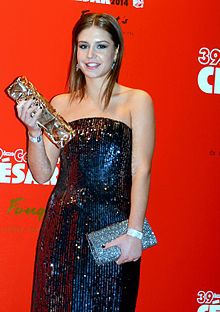 | |||||||||||||||||||||||||||||||||||||||||||||||||||||||||||||||||||||||||||||||||||||||||||||||||||||||||||||||||||||||||||||||||||||||||||||||||||||||||||
| |||||||||||||||||||||||||||||||||||||||||||||||||||||||||||||||||||||||||||||||||||||||||||||||||||||||||||||||||||||||||||||||||||||||||||||||||||||||||||
| |||||||||||||||||||||||||||||||||||||||||||||||||||||||||||||||||||||||||||||||||||||||||||||||||||||||||||||||||||||||||||||||||||||||||||||||||||||||||||
| Totals | 39 | 96 | |||||||||||||||||||||||||||||||||||||||||||||||||||||||||||||||||||||||||||||||||||||||||||||||||||||||||||||||||||||||||||||||||||||||||||||||||||||||||
| References | |||||||||||||||||||||||||||||||||||||||||||||||||||||||||||||||||||||||||||||||||||||||||||||||||||||||||||||||||||||||||||||||||||||||||||||||||||||||||||
Blue Is the Warmest Colour (French: La Vie d'Adèle – Chapitres 1 & 2; French pronunciation: [la vi dadɛl ʃapitʁ œ̃n‿e dø]) is a 2013 French romantic coming-of-age drama film directed by Abdellatif Kechiche, and produced by Kechiche, Brahim Chioua, and Vincent Maraval. The screenplay also co-written by Kechiche was based on Jul Maroh's 2010 graphic novel of the same name.[1] Adèle Exarchopoulos stars as a teenager who falls in love with an older woman played by Léa Seydoux.[2]
The film premiered at the 66th Cannes Film Festival on 23 May 2013 where it won the Palme d'Or. For the first time, the jury at Cannes presented the award to three recipients: Kechiche, Exarchopoulos, and Seydoux.[3] At the age of 19, Exarchopoulos became the youngest recipient of the award.[4] The film grossed over €14 million at the worldwide box office on a production budget of €4 million.[5][Note 1][7] Rotten Tomatoes, a review aggregator, surveyed 197 reviews and judged 89% to be positive.[8]
Blue Is the Warmest Colour garnered awards and nominations in a variety of categories with particular praise for Kechiche's direction, and the performances of Exarchopoulos and Seydoux. At the 39th César Awards, the film received eight nominations including Best Film, Best Director for Kechiche, and Best Actress for Seydoux. Exarchopoulous was the sole winner for Most Promising Actress. She also won the Critics' Choice Movie Award for Best Young Performer, Lumières Award for Best Female Revelation, and Best Breakthrough Actress from the National Board of Review. Seydoux garnered the Lumières Award for Best Actress as well as a nomination for the BAFTA Rising Star Award. The film also received an Independent Spirit Award, Bodil Award, Robert Award, and Guldbagge Award.
- ^ Mayer, Sophie. "Blue is the Warmest Colour review". British Film Institute. Archived from the original on 18 February 2015. Retrieved 22 September 2015.
- ^ Bradshaw, Peter (21 November 2013). "Blue Is the Warmest Colour – review". The Guardian. Archived from the original on 8 October 2021. Retrieved 22 September 2015.
- ^ Cite error: The named reference
Canneswas invoked but never defined (see the help page). - ^ Hammond, Pete (26 December 2013). "Oscars: Sundance Selects Ramps Up 'Blue Is The Warmest Color' Star's Best Actress Bid (Video)". Deadline Hollywood. Archived from the original on 11 February 2021. Retrieved 25 August 2015.
- ^ "Blue Is the Warmest Colour". BoxOffice.com. Archived from the original on 23 September 2015. Retrieved 25 August 2015.
- ^ "Yearly Average Rates". UKForex. Archived from the original on 16 March 2015. Retrieved 1 November 2015.
- ^ Schmidlin, Charlie (29 May 2013). "'Blue Is The Warmest Color' Crew Bring Allegations Of "Bullying" & "Anarchic" Over-Budget Production". Indiewire. Archived from the original on 25 September 2020. Retrieved 23 November 2017.
- ^ "Blue Is the Warmest Colour (2013)". Rotten Tomatoes. Archived from the original on 28 December 2019. Retrieved 7 November 2019.
Cite error: There are <ref group=Note> tags on this page, but the references will not show without a {{reflist|group=Note}} template (see the help page).